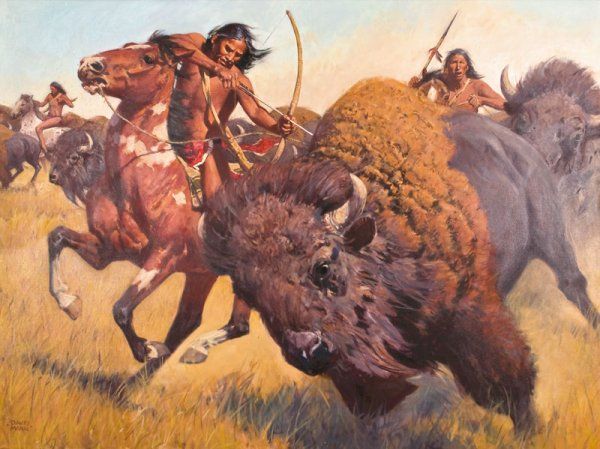
This interesting article details the saga of the American bison — colloquially known as the buffalo — in the United States. I transcribed it for the blog in Anniversary Gregg.
Attachment: the-unvanished-american.pdf
The Gregg Group was founded 22 May 2004, prompted by the lack of online shorthand resources. As the primary use for shorthand — business and legal recording — has waned in recent decades, we generally acclaim the skill as a hobby or personal tool. The purpose of the group is to promote the use of Gregg systems of shorthand by providing advice to beginners, support for students, and an association of users of this efficient, attractive, and enjoyable method of writing.

This interesting article details the saga of the American bison — colloquially known as the buffalo — in the United States. I transcribed it for the blog in Anniversary Gregg.
Attachment: the-unvanished-american.pdf
You must be logged in to post a comment.
Well, that was an exciting read – in several places at least.
I could not find an online version of Mr Fenimore's article, so I have more questions than I'd like to trouble you with, though some are just a clarification on names. The first one is on the first line.
(1) p1c1l1: "is one of the ? creatures"
(2) p2c1l5: "it was a ? they'll never forget" (The only word I could guess was "spectacle" but my dictionary did not show that.)
(3) p3c1l4: Is the first word "medicine"? (It seems a strange word to use in that context.)
(4)(5) p3c1 lines 20/21: "near Oxford Nebrasca a ? ? owned a"
(6) p4c1l12: " ? ? in Mexico"
(7)(8) P5c118: is it South Caralolina? (My book only showed the abbreviation S.C.) And what is the last word on that line?
(9) p5c2l19: "natural enemy was ? nature itself"
(10) p6c1l5: just to get the name right — I guessed "Shine Wells" (?)
(11) p6c2l14: "darker and more ? buffalo"
(12) p6c2l17: "mountains of central(?) ? "
(13) p7c2l17: I presume this is "Central Pacific" but I am not familiar with American railroads.
(14) p8c2l20 "Eastern states.) ? voices were"
(15) p9c9l8: again I guess the railroad to be "Union Pacific"
(16) p9c1l15: " ? hunters"
(17) p10c1l10: " ? a private herd"
(18) p10c2l18: Is the word "didn't"? I've always omitted the "e". Would that be bad? (And by the way, two lines earlier "to behave"; when studying Psychology, and during my Simplified Gregg period, I used just b-v for behavior.)
(19) p11c2l6: "and six thousand ? "
It was a real page-turner. But I didn't realise that Buffaloes were so dumb!
Actually, bison are more intelligent than cattle, but like all wildlife, it's better to keep them at a distance!
This article had lots of phrases, and some of the outlines you were wondering about were phrases:
Page 1 column 1 line 1: "orneriest"
Page 2 column 1 line 5: "experience"
Page 3 column 1 line 4: Yes, in this case "bad medicine."
Page 3 column 1 lines 20/21: "near Oxford, Nebraska, a number of years ago. Cole owned a six-year-old"
Page 4 column 1 line 12: "Montezuma's zoo in Mexico"
Page 5 column 1 line 18: Yes, South Carolina. The last word is "Georgia" (I had forgotten the capitalization marks, so I added them.)
Page 5 column 2 line 19: "to some extent"
Page 6 column 1 line 5: "Cheyenne Wells", a small town in Colorado, near the Kansas border.
Page 6 column 2 line 14: "handsome"
Page 6 column 2 line 17: "Centre County", a county in Pennsylvania that includes the city of State College, home of Penn State University's main campus.
Page 7 column 2 line 17: "Kansas Pacific" (most of these railroads no longer exist). The KP eventually became part of the Union Pacific, which still operates in the US.
Page 8 column 2 line 20: "Here and there"
Page 9 column 1 line 8: Yes.
Page 9 column 1 line 15: "Hide" (I had forgotten the h-dot).
Page 10 column 1 line 10: "which had"
Page 10 column 2 line 18: No worries if you don't add the e to "didn't." The e is added to make it consistent with "did not", which as an e in Anniversary, so that it is not confused with “would not/wouldn’t.” The e was removed in Simplified and later. For "behave", as long as you don't confuse it with "before" I don't see an issue.
Page 11 column 2 line 6: "in the United States"
Thanks Carlos.
Well I should have got "experience" !!
But as for "orneriest" it was not in my Oxford English Dictionary. But I now see that in North America "ornery" means bad tempered or difficult to deal with — very appropriate for a buffalo. (I will try to find a use for it if cross the Atlantic!)
As you see, I find phrases hard to read and I only use simple ones in writing — though I am adding to them as I find more which come naturally.
Things like didn't, wouldn't, would-not, do-not, don't etc I also find hard. Even after trying to make a table of all the variants, no underlying pattern seems to emerge.
(As for behave, I always emphasis it with a long "v".)
Many thanks for your reply and the background details you gave.
Nick
You're welcome!